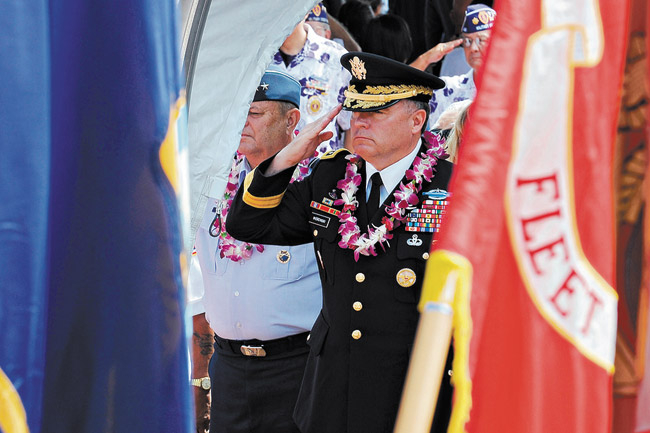Military Leaders And Universities
Let’s talk about Lt. Gen. Francis Wiercinski, one of the finalists for the vacant University of Hawaii presidency.
Wiercinski’s nomination has met with resistance. At a recent meet-the-finalist meeting, several students protested that hiring him would result in the “over-militarization of Hawaii.”
mw-boylan-052114-francis-wiercinski-nw
Soon thereafter, Manoa English professor Cynthia Franklin began circulating a petition opposing Wiercinski’s appointment. On the eve of last week’s Board of Regents meeting, 350 people had signed it.
The petitioners protested that the general listed no higher education leadership on his resume and didn’t know enough about Hawaii’s society, culture and history.
I’ve never met Wiercinski, nor have I attended any of his meet-the-finalist meetings. Prof. Franklin apparently has. She’s been quoted as saying “his lack of qualification was compounded by the fact that he didn’t seem capable of thinking outside the military box.”
Let’s start with the students’ concerns with the over-militarization of Hawaii.
A general as UH president, even if he reported to his Bachman Hall office dressed in fatigues and demanded salutes from chancellors and deans, couldn’t militarize these isles much more than they already are.
Hawaii’s militarization began with the Reciprocity Treaty of 1887 and was cemented with the Spanish-American War and the annexation of Hawaii to the United States as its northern Pacific outpost.
The Japanese attack on Pearl Harbor doubled Hawaii’s population to 1 million, more than half of whom were soldiers, sailors and the defense workers who came to support them.
The Cold War between the United States and the Soviet Union made military expenditures the third leg of the Islands’ economy. With the death of plantation agriculture, it’s now the second leg supporting a shaky economic stool.
Let’s turn to the “military box” Prof. Franklin discerns Gen. Wiercinski occupying. Many outside academe have discerned that people like
Prof. Franklin and myself think inside a box of our own. They’ve given it a more genteel name, “ivory tower,” the heights of which few are allowed to climb without a slew of letters behind their names and a high tolerance for the ridiculous, the sublime and the politically correct.
We residents of the ivory tower might benefit a general in the presidential office – or a successful businessman, or even (now don’t cringe, dear reader) an out-of-office politician.
That general might well bring experience working with far more 18-23-year-olds than currently enroll in Hawaii’s 10-campus university system.
He might well, as Wiercinski has, have served in our two most recent wars, have seen the futility of them, and recognized that the culture that led to our participation in those wars must be changed.
Columbia University once made a general its president. His name was Dwight David Eisenhower. He’d already managed the invasions of North Africa and Normandy during World War II, and he would go on to become President of the United States in 1953.
Other generals criticized Commander-in-Chief Ike for emphasizing nuclear deterrence over conventional forces. Their criticism didn’t matter. He maintained the peace, and the folks loved him. Eisenhower easily won reelection in 1956 and left office with an approval rating equaled by no departing president since.
But in 1960, Eisenhower famously warned the nation against the growing influence of a “military-industrial complex.”
The presidents who followed failed to heed his warning, thus Vietnam, Afghanistan and Iraq.
Nonetheless, Ike demonstrated that generals can think outside their boxes, certainly as well as politicians or academics.
dbboylan@yahoo.com






